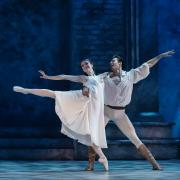Theatre couple Deborah McAndrew and Conrad Nelson join up with Halifax based theatre company
Both Deborah McAndrew and Conrad Nelson will be involved in Halifax based theatre company, Northern Broadside’s next production which is an adaptation of a classic story. Their relationship, however, is more than just a working one.
There is a fond connection that Deborah and Conrad have with Northern Broadsides, the theatre company who this year celebrate their 25th anniversary. Conrad has always been involved with the company throughout this quarter century period, but it was due one particular performance that changed his life. “Back in 1995 we put on a performance of ‘A Midsummer Night’s Dream’. Deb played the role of Hermia and I was Demetrius and that was how we first met.” That meeting sparked a relationship which led to marriage and the pair have since worked together on plays for many years. “I think this is the fifth foreign language adaptation we’ve worked on together,” Conrad recalls. “We have quite a robust working relationship together. We think along similar lines and we make decisions that make sense for us both. There are arguments,” he laughs, “but they are constructive and that is the way a working relationship works.”
Deborah is taking the writing credit for the Broadsides next play which is an adaptation of the French classic, ‘Cyrano De Bergerac’ in which Conrad will be directing. “I’ve always loved the story,” Deborah beams. “There are many different versions of the story, but the very first time it ever crossed my radar was way back in the mid-70’s when Morecambe and Wise performed it and obviously there was lots of larking about with false noses. Penelope Keith played Roxanne in their version. It’s the eternal unrequited love story and I am very pleased to be able to do it.” Deborah continues, “It’s a massive role and requires such a tool kit from the actor as they have to play so many different colours and different moods. It’s a verse drama as well which I’ve tried to honour with heightened language and verses. Fifty percent of it is in verse and the rest in height and prose. I’ve done a number of classic foreign language play adaptations now and most of them have been updated and anglicised brought it into English in and set it more recent times. I had to do the same with previous adaptations, The Government Inspector, The Grand Gesture and Accidental Death of an Anarchist.”
“It’s a story I’ve always wanted to do as well,” Conrad adds. “I actually performed it two years ago as a radio drama and really enjoyed it. It has all the elements that we need and that the Northern Broadsides love. It has everything, the broad comedy, the romance. It’s a fantastic piece of drama.”
“It’s very French!” Deborah smiles. “Obviously, it is French, but the story was written at the end of the 19th century and feels strangely like a Victorian melodrama in style, but set in 1640 which was the time of the Musketeers, so it is a very romantic time of period for how English people view it. During the period of time the Thirty Years War was in full flow, a war in which France and Spain were on the opposite sides and is part of the story.”
I asked how the version would differ from the original and the struggles any writer or director would have in producing an adaption. “The story is the same as is the structure,” Deborah begins. “It is a well-structured Five Act play which is set in Paris, moves to the war and then back to Paris 14 years later. It’s an epic sweep of time to give it the feel of a big story. I did a lot of character development with the story. There was a character in the original play called Lignière who only appeared in Act One and I’ve developed him and brought him through the whole play. He is a drunken poet, but I felt that he was a waste of a good character. The original story also has a cast of between 40-50 people, so I had to work the story to fit in with a cast of 13 people meaning that characters are doubled so there becomes an ensemble within the company and hopefully it won’t be confusing as I’ve tried to give a clarity of lines so the audience would be able to differentiate. I looked closely at the reading of Roxanne played in many versions by several different women.” Deborah continues. “There were parts of the character that didn’t quite work in the play. She comes across as being quite gullible, but she is actually quite an intelligent, brilliant woman. She is the love of Cyrano’s life, so she has to be equal to his intellect and passion. The idea is to put a Roxanne on the stage that is all of those things and not just a pretty face.”
“That is the point of an adaptation, you can choose the narrative line,” Conrad interjects. “It would be economical suicide to have so many members of cast which is why we look at multiple part players, but not looking at players to portray ten different roles. To see that many people on stage has a completely different feel to it with drama and for me it’s great to be in a room full of actors and creatives, it makes a terrific working environment.”
That is the manner in which Deborah writes, with the audience in mind as she goes on to explain. “I always work on the assumption that nobody has heard this story before. I’ll look for anywhere that I can plot points that are unclear or are taken for granted in terms of the knowledge of the audience to question it and make sure the story is being told with clarity to someone who has never heard it before.”
I asked if there were any restrictions when performing a play of this magnitude. “There’s not a lot of restrictions,” Conrad answered. “Northern Broadsides have their own costume department and the costume and technical aspect of the company is exceptional and is on par with anybody else, so we didn’t have to compromise. When you start to add things like costumes then the costs go up, so we have to be cautious as well as ambitious. You try and do as much as you can for the company which is difficult, but nobody has short changed on us. This is a huge Production for us and there are a lot of people involved along the way as we want to design, produce and re-direct every single time we perform in multiple theatre spaces, so it almost becomes three times the size or three productions in one. You can imagine there is a lot of work goes on behind the scenes to enable it all to come together. What you see on stage is really under pinned. It’s like when you see the film credits at the end of a motion picture. You’ve just watched ninety minutes of film and you see there’s about 2,000 people that were involved.”
Deborah goes on to explain the process of writing an adaptation in comparison to a new piece of work. “It’s not really difficult, but more about the task in hand, or the brief as it were. Adapting work has different challenges across all formats. I just sit down to the task that is on my desk and approach it in the same manner and see what I need to do. Sometimes adapting is easier as plot is the hardest thing to come up with, but then it is a good way to hone your toolkit as a dramatist so you can be more objective about what really works and take that learning back into your own work which allows you to be very vigorous and brutal with it. My focus, as explained before, is the audience experience. How to tell them that story and how to lead them on that path. To take them on that journey with all the highs and the lows. My previous work for Broadsides, August Bank Holiday Lark, was challenging as it was a story that everyone knew. They know that a story about the First World War isn’t going to end well. They will know that something will be sad at some point, so the challenge was to stay off that moment for as long as possible and make the joy of life so full and seductive. To make the characters people that the audience can identify with and enjoy the company of. To keep the audience guessing as to how that will pan out. There’s actually a drama rule there. With a show about dancing there has to come a point where somebody loses a leg. It sounds very brutal, but it is also very poignant. It’s an exercise in imagination and the hocus pocus of creativity which is difficult to explain as it is quite mysterious. The vigour and craft of making it work is like a piece of music. When I write, I am wondering what it would be like to be sitting out there watching it, is the story clear? Are they feeling it in the way that I want them to do so? It’s how you put on the page that helps them to understand. It’s about the words in the play, the accents, the grammar, the character, the context which is important. Each line has to work hard. I want an audience to leave the theatre feeling like they’ve really been told a story that has satisfied them.”
The relationship between the writer and director of any play can form a strong bond, but none as stronger as the bond and understanding the both Conrad and Deborah have as they go on to explain. “The working relationship is good,” Deborah smiles. “We draw the lines where they are drawn. The text is mine and I deliver it and if there are any questions about that then they will come to me. Conrad never changes any of the text and I don’t tell him how to direct it. As long as the boundaries are clear.”
“We have an understanding and we think similarly,” Conrad continues. “There’s a scene in Act 2 where, in the original story, there is a fifteen minute piece of dialogue regarding the moon. It’s quite dull!” Conrad laughs. “Basically, Cyrano is tasked to keep a character from Roxanne’s house for fifteen minutes and he does so by disguising himself and pretends that he has fallen from the moon.”
“It’s very important to the plot,” Deborah follows up. “There are lots of reasons why this is in the original. The real Cyrano was a scientist, a swordsman, a poet, a playwright and a musician and he actually wrote a book about the moon. We couldn’t expect an audience to sit there for fifteen minutes listening to him speak.”
“We had to intersperse it with music and subtle changes of light,” Conrad adds. “Deb and I spoke in depth about how we could do that to give the impression to the audience that it’s been fifteen minutes, when really, it’s been about two or three minutes.”
The play opens on Friday 3rd February, but it’s one of many huge Productions for Conrad. “In a few weeks’ time I am directing an Arnold Bennett play. He was a local playwright born in Hanley in Staffordshire. The play is an adaptation of one of his novels, ‘Anna of the Five Towns’ and it’s to celebrate his 150th anniversary. After that, Northern Broadsides are doing Richard III in Hull, so I will be involved in three major productions. It means I’ll be spinning a lot of plates, but I love having too much to do!”
I got a warm sense of the enthusiasm from both Deborah and Conrad when they spoke about their work and the theatre, something that Conrad says is encapsulated in a Northern Broadsides performance. “Audiences see the enthusiasm that everyone has at Broadsides when they come and see the play. It is a great sense of feeling. Why would anyone want to do anything that doesn’t inspire them?”
Cyrano opens on Friday 3rd February to Saturday 25th February at the New Vic Theatre, Newcastle-under-Lyme and then continues on tour from there.
Tue 28 Feb - Sat 4 Mar – West Yorkshire Playhouse, Leeds
Tue 14 - Sat 25 Mar - Liverpool Playhouse
Tue 28 Mar - Sat 1 Apr – The Dukes, Lancaster
Tue 4 - Sat 8 Apr –Stephen Joseph Theatre, Scarborough
Tue 11 - Sat 15 Apr – York Theatre Royal
Tue 18 - Sat 22 Apr – The Lowry, Salford Quays
Tue 9-13 May - The Viaduct Theatre, Halifax



























